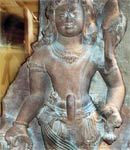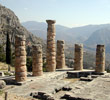The First Christians
"Haters of the human race"?
Christianity – the triumph of perversity
From Judaism, the enthusiasts of Christ derived the notion that the body was a source of shame and that women were an inferior breed. They agreed with the rabbis that the role of the priest was to license permissible sex and police the most intimate of human behaviour.
But the early Christians were also influenced by Hellenic ideas that the passions were inherently suspect, that sex was harmful to the soul, and that abstinence was the path of spiritual purity. The circumspection, disdain and outright condemnation of human sexuality in the dogmas of the church gave rise, for two millennia, not only to the most monumental hypocrisy but to all manner of sexual-emotional disorders.
Why doesn't Jesus like sex?
“Every man is tempted, when he is drawn away of his own lust, and enticed. Then when lust hath conceived, it bringeth forth sin: and sin, when it is finished, bringeth forth death.”
– James 1.14,15.
“In the image of God created he him; male and female created he them.”
– Genesis 1,27.
“Jewish folk wisdom, like that of the pagans, stressed the seductive wiles of women, and the disruptive effect of the claims that women made upon men as bearers of their children and the sharers of their bed.”
– Brown,The Body and Society, p39.
“Love of pleasure … leadeth the young as a blind man to a pit and a beast to a precipice.”
– Testament of the Twelve Patriarchs.
“The hundred and forty and four thousand, which were redeemed from the earth. These are they which were not defiled with women; for they are virgins.”
– Revelation 14.3,4
The Jews had cut off foreskins as a sign of their bond with God. Now the Christians would go further and deny their sexuality entirely.

The curse of women – the female "temptress"
Sexual pleasure – the first and bitterest fruit of “original sin”.
” And Adam was not deceived, but the woman being deceived was in the transgression.”
– 1 Timothy 2.14.
“For I know that in me , that is, in my flesh, dwells no good thing … I see another law in my members, warring against the law of my mind, and bringing me into captivity to the law of sin which is in my members. O wretched man that I am! who shall deliver me from the body of this death?”
– Romans 7.18,24.
“This know also, that in the last days … men shall … creep into houses, and lead captive silly women laden with sins, led away with divers lusts.”
– 2 Timothy 3.1,7.
The Gnostic Challenge – The Polluted Spirit
“Dearly beloved, I beseech you as strangers and pilgrims, abstain from fleshly lusts, which war against the soul.”
– 1 Peter 2.11.
“To shape and manage her creation, Wisdom brought forth the demiurge, the creature God of Israel, as her agent.”
– Elaine Pagels, The Gnostic Gospels, p76
“It is good for a man NOT to touch a woman … I say therefore to the unmarried and widows. It is good for them if they abide even as I.”
– 1 Corinthians 7.1,8.
“St Paul’s” instruction was to “mortify sinful flesh”, that is deny the sexual appetites. Such detachment from carnality allowed the gnostics to accept an equality of the sexes quite radical for the ancient world.
Ironically, while gnosticism would be driven from the world stage by its Catholic enemies, it was gnosticism’s negative view of the body which would underpin many of Catholicism’s worst traits: a bleak asceticism, starvation fasting, flagellation, and the whole paraphernalia of mortification of the flesh. The early Church Fathers, including the authors of Paul’s epistles, glorified the asceticism that had been a discipline of the gnostics. Martyrdom, the ultimate mortification of the body, became the epitome of spirituality, a fast-track to salvation.
Virgin purity: closer to God
“You should abstain from fornication … Every one of you should know how to possess his vessel in sanctification and honour. Not in the lust of concupiscence, even as the Gentiles which know not God … For God hath not called us unto uncleanness, but unto holiness.”
– 1 Thessalonians 4.3,7.
In time, as the sacred feminine was relentlessly subsumed into Catholicism, the virginity of the godman’s mother would be extended through the birthing process (virginitas in partu) and on through the rest of her life (virginitas post partum). This created a theological conundrum because the sacred history had already given the godman four brothers and two sisters (Mark 6.3; Matthew 13.55,56)! But extra-biblical fabrication (‘Protevangelium of James’) would come to the rescue, making JC’s siblings into step-brothers and step-sisters. Later, Jerome would downgrade the inconvenient siblings further, into mere “cousins”. At the same time Catholicism acquired a transcendent, sexless and meek “queen of heaven”, forever at the hierarchy’s beck and call.
Lethal brew – Catholic Orthodoxy
“Resisting the gnostic view that Jesus was a spiritual being, the orthodox insisted that he, like the rest of humanity, was born, lived in a family, became hungry and tired, ate and drank wine, suffered and died. They even went so far as to insist that he rose bodily from the dead.”
– Elaine Pagels, The Gnostic Gospels, p113.
Sex the enemy of holiness
” An ascetic movement grew up in the church in opposition to heresies with an anti-sex bias. Orthodoxy itself started disparaging marriage. Purity became identified with sexual abstinence; chastity replaced charity as the central virtue of the Gospel. Religion, as a consequence, became sombre and joyless.”
– De Rosa, Vicars of Christ, p399.
The gnostics and Stoics had already declared “the passions” suspect. The apologist Justin, in the mid-years of the 2nd century, could boast that there were already old men “in Christ” who had maintained an “immaculate purity” their entire life (Apology I.2). Antipathy to the sex act became a cornerstone of the new religion. Church father Tertullian (160-220) feared that a man’s soul was lost in the moment of ejaculation:
“In that last breaking wave of delight, do we not feel something of our very soul go out from us?”
– Tertullian, de anima, 27.5.
A shadow over marriage
“The silken threads of Christian deportment, woven so carefully around the person in the daylight hours, must not be torn apart at night.”
– Paiedagogos, 2.10.
His successor Origen (182-251), a self-castrating fanatic, went further, maintaining that the soul became “polluted” in the act of sex. Origen deprecated marriage itself. God’s conduit for joining with humanity had been a virgin body. It followed, therefore, that through virginity the body should be made “holy”:
“The body … was made that it should be a temple to the Lord … the soul, as it were, a priest serving before the Holy Spirit. In this manner, Adam had a body in Paradise, but in Paradise he did not ‘know’ Eve.”
– Origen, fragment on I Corinthians.
“It was the first but arduous duty of a Christian to preserve himself pure and undefiled by the practice of idolatry … The innumerable deities and rites of polytheism were closely interwoven with every circumstance of business or pleasure … The Christian, who with pious horror avoided the abomination of the circus or the theatre, found himself encompassed with snares in every convivial entertainment, as often as his friends, invoking the hospitable deities, poured out libations to each other’s happiness.”
– Edward Gibbon, Decline and Fall, 15.
From India, an Alternative View

Hindu Lord Shiva proudly sports an erection (7th century. British Museum)

Don't call me Babe. Large breasted Durga – fierce consort of Shiva. Her eight arms represent the energy of all the gods.
Sources:
- Cullen Murphy, The Word According to Eve (Allen Lane, 1998)
- Richard Dawkins, The God Delusion (Bantam, 2006)
- Sigmund Freud, The Future of an Illusion (1927)
- Sam Harris, The End of Faith (Free Press, 2005)
- Paul Tabori, A Pictorial History of Love (Spring, 1968)
- Elaine Pagels, The Gnostic Gospels (Phoenix, 1980)
- Uta Ranke-Henemann, Eunuchs for the Kingdom of Heaven (Penguin, 1993)
- Peter Brown, The Body and Society (Colombia, 1990)
- James Tabor, The Jesus Dynasty (Harper,2006)
Related Articles:
Adoration of a sexless Mother Goddess

The Christians neutered female sexuality by manufacturing a passive goddess who moved seamlessly from virginity to motherhood without the nasty business of sex in between.

The joyful temples of the pagans, which had served the mother goddess for millennia, were an early target of the Church fathers.
The wrecking crews were monks not barbarians.

* JC approves of polygamy!
“And while they went to buy, the bridegroom came; and they that were ready went in with him to the marriage: and the door was shut.”
– Matthew 25.10.
A Stoic view of desire


Jesus Christ – descended from a whore!
Christian sex attitudes? "Like an angel"


Christian sex attitudes? "Morbid and unnatural"
Nudity - Natural or Shame?


A nation of prudes
